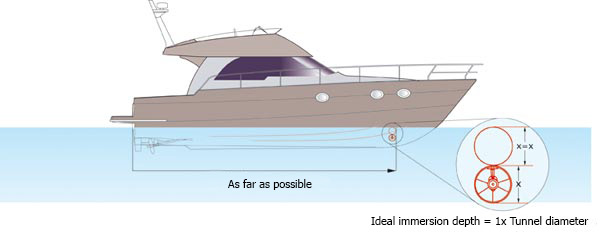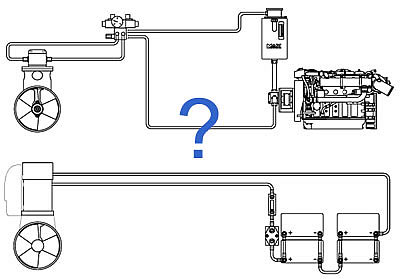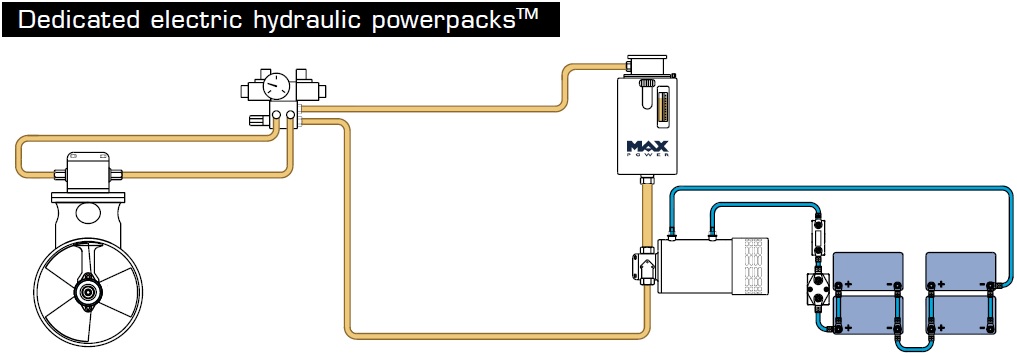How to choose the correct Thruster for your Boat
For every boat owner it is important to chose the correct thrust rating (or
relative power) whether it will be a tunnel thruster or a retractable
thruster. To help simplify the complicated calculations associated with the
many variables in a boat design, we have designed the following charts to make
your decision easier:
To use these charts there are two factors (excluding the length of your
boat), which you need to determine:
1. The relative size & wind area of your yacht
For a boat of any given length, the area it offers to a direct side wind can
vary from one design to another. The underwater shape & total weight can also
differ greatly. However, most recreational boats, both motor and sail, will
fit into one of three categories:
- Cruising
- Fast cruising
- Super fast cruising
2. The conditions in which you use your boat (thruster force
required)
Different people have different uses for their boat. For example, an
expedition yacht on a world cruise would have different needs to a picnic boat
berthed on a lake. In conclusion, some people would like a more powerful
thruster than others. If the size of your boat intersects more than one
thruster on the selection chart, the choice of thruster will depend on the
situations and conditions in which it will be used.
FAQ
Positioning thrusters is often as important as choosing the right thrust
output when seeking maximum manoeuvring performance for your boat. Thruster
turbines need to be placed one full propeller diameter under the water line to
achieve optimum thrust. The thruster must also be positioned as far forward in
the bow or as far back in the stern as possible. A thruster stepped back from
the bow (or stern) would need to be more powerful than one mounted further
forward (or back), to achieve the same turning effect on the boat.

Most motor boat designs are well suited to fixed tunnel thruster
installations. However, the above-described constraints (depth and
positioning) often contradict each other, especially in modern sailing yachts.
Although some sailing yachts can achieve good results with tunnel thrusters,
most modern designs would work better using a retractable solution.

The combined use of a bow and stern thruster adds a whole
new level of control when maneuvering in difficult conditions or tight
corners.
Turning on the spot or even stepping the entire boat sideways becomes
possible at the flick of a switch.
Max Power offers stern thruster adapters for the entire tunnel thruster
range. A range of Ignition Protected thrusters is also available thus enabling
the use of a stern thruster in habitually damp zones or petrol-powered boats.
On boats where conventional tunnel stern adapters cannot be used due to
lack of immersion depth or the positioning of drive systems, retractable stern
thrusters offer an attractive & powerful solution.
 Bow
and stern thrusters whether retractable or tunnel require a power source. On a
boat this can be either a 12/24V DC (electric) motor or a hydraulic motor. The
hydraulic motor will need to draw power from a thermal engine (via a hydraulic
pump) or a remote mounted DC motor (also via a hydraulic pump). The DC motor
will draw power directly from a battery bank.
The choice of power will
depend on factors such as frequency of use, runtime required, and thruster
size needed.
Hydraulic thrusters need a carefully designed hydraulic system to run them
reliably and efficiently. Often this system may only be required for the
boat’s thruster(s). The most common form of thruster only system uses an
engine as its power source. These can offer unlimited run times and do not
need batteries or high power cables. Two types of hydraulic pumps can be used
for these dedicated systems.
 Variable displacement pumps
Variable displacement pumps
A variable displacement pump can be used when a fixed flow is needed but the
engine RPM is likely to vary. This would typically be a main engine or gearbox
mounted pump. Often used on large powerboats, these systems offer a powerful
solution for larger thrusters.
Fixed displacement pumps
Used when a generator with a PTO (power take off) is available, fixed
displacement pumps give a single (fixed) flow at a given engine RPM. Highly
robust, these systems are simple to install and cost effective.

Although still fundamentally a DC thruster, a hydraulic unit run from a DC power
pack offers a host of advantages over conventional DC thrusters.
- Better weight distribution in the boat
- The ability to fit the thruster unit in habitually damp and even wet areas
such as sail lockers
- Allows the DC motor to be placed close to the batteries that supply it, whilst
still enabling the installation of the thruster(s) in the
boat’s extremities
Whether run from a DC motor or an engine, Max Power can supply a full range of
components including all necessary accessories
such as a variety of oil tanks and control valves. In both cases Max Power can
advise and assist in the design of an efficient system suited to your needs
|
|
|